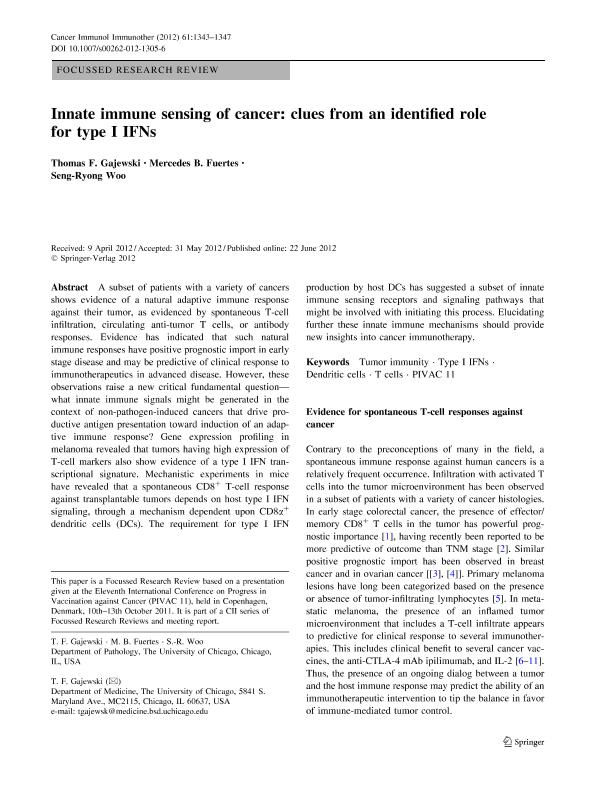Mostrar el registro sencillo del ítem
dc.contributor.author
Gajewski, Thomas F.
dc.contributor.author
Fuertes, Mercedes Beatriz

dc.contributor.author
Woo, Seng Ryong
dc.date.available
2017-08-11T15:51:48Z
dc.date.issued
2012-06
dc.identifier.citation
Gajewski, Thomas F.; Fuertes, Mercedes Beatriz; Woo, Seng Ryong; Innate immune sensing of cancer: clues from an identified role for type I IFNs; Springer; Cancer Immunology Immunotherapy; 61; 8; 6-2012; 1343-1347
dc.identifier.issn
0340-7004
dc.identifier.uri
http://hdl.handle.net/11336/22179
dc.description.abstract
A subset of patients with a variety of cancers shows evidence of a natural adaptive immune response against their tumor, as evidenced by spontaneous T-cell infiltration, circulating anti-tumor T cells, or antibody responses. Evidence has indicated that such natural immune responses have positive prognostic import in early stage disease and may be predictive of clinical response to immunotherapeutics in advanced disease. However, these observations raise a new critical fundamental question?what innate immune signals might be generated in the context of non-pathogen-induced cancers that drive productive antigen presentation toward induction of an adaptive immune response? Gene expression profiling in melanoma revealed that tumors having high expression of T-cell markers also show evidence of a type I IFN transcriptional signature. Mechanistic experiments in mice have revealed that a spontaneous CD8+ T-cell response against transplantable tumors depends on host type I IFN signaling, through a mechanism dependent upon CD8α+ dendritic cells (DCs). The requirement for type I IFN production by host DCs has suggested a subset of innate immune sensing receptors and signaling pathways that might be involved with initiating this process. Elucidating further these innate immune mechanisms should provide new insights into cancer immunotherapy.
dc.format
application/pdf
dc.language.iso
eng
dc.publisher
Springer

dc.rights
info:eu-repo/semantics/openAccess
dc.rights.uri
https://creativecommons.org/licenses/by-nc-sa/2.5/ar/
dc.subject
Cancer
dc.subject
Linfocitos T Cd8
dc.subject
Interferon
dc.subject
Celulas Dendriticas
dc.subject
Tumor Immunity
dc.subject.classification
Bioquímica y Biología Molecular

dc.subject.classification
Medicina Básica

dc.subject.classification
CIENCIAS MÉDICAS Y DE LA SALUD

dc.title
Innate immune sensing of cancer: clues from an identified role for type I IFNs
dc.type
info:eu-repo/semantics/article
dc.type
info:ar-repo/semantics/artículo
dc.type
info:eu-repo/semantics/publishedVersion
dc.date.updated
2017-06-29T13:39:10Z
dc.identifier.eissn
1432-0851
dc.journal.volume
61
dc.journal.number
8
dc.journal.pagination
1343-1347
dc.journal.pais
Alemania

dc.journal.ciudad
Berlin
dc.description.fil
Fil: Gajewski, Thomas F.. University Of Chicago; Estados Unidos
dc.description.fil
Fil: Fuertes, Mercedes Beatriz. University Of Chicago; Estados Unidos. Consejo Nacional de Investigaciones Científicas y Técnicas; Argentina
dc.description.fil
Fil: Woo, Seng Ryong. University Of Chicago; Estados Unidos
dc.journal.title
Cancer Immunology Immunotherapy

dc.relation.isreferencedin
info:eu-repo/semantics/reference/url/Innate immune sensing of cancer: clues from an identified role for type I IFNs
dc.relation.isreferencedin
info:eu-repo/semantics/reference/doi/10.1007/s00262-012-1305-6
dc.relation.isreferencedin
info:eu-repo/semantics/reference/pmid/22722449
dc.relation.alternativeid
info:eu-repo/semantics/altIdentifier/doi/http://dx.doi.org/10.1007/s00262-012-1305-6
dc.relation.alternativeid
info:eu-repo/semantics/altIdentifier/url/https://link.springer.com/article/10.1007%2Fs00262-012-1305-6
Archivos asociados
